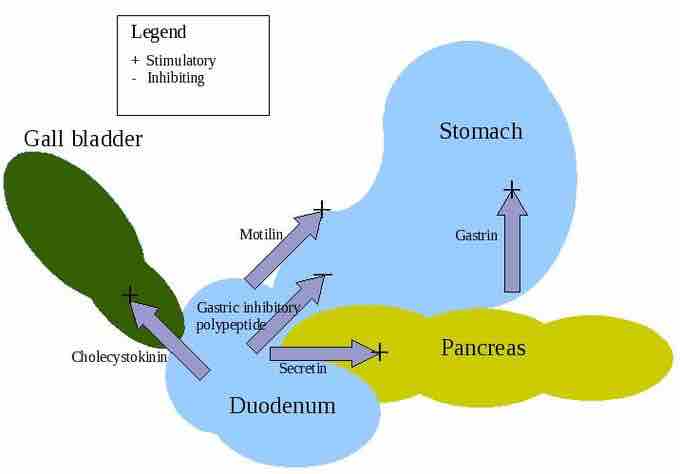Hormones of the Digestive System
There are five main hormones that aid in regulation of the digestive system in mammals. There are variations across the vertebrates, for instance in birds. Arrangements are complex and additional details are regularly discovered. For instance, more connections to metabolic control (largely the glucose-insulin system) have been uncovered in recent years.
- Gastrin is in the stomach and stimulates the gastric glands to secrete pepsinogen (an inactive form of the enzyme pepsin) and hydrochloric acid. Secretion of gastrin is stimulated by food arriving in the stomach. The secretion is inhibited by low pH.
- Secretin is in the duodenum and signals the secretion of sodium bicarbonate in the pancreas and it stimulates the bile secretion in the liver. This hormone responds to the acidity of the chyme.
- Cholecystokinin (CCK) is in the duodenum and stimulates the release of digestive enzymes in the pancreas and stimulates the emptying of bile in the gall bladder. This hormone is secreted in response to fat in chyme.
- Gastric inhibitory peptide (GIP) is in the duodenum and decreases the stomach churning in turn slowing the emptying in the stomach. Another function is to induce insulin secretion.
- Motilin is in the duodenum and increases the migrating myoelectric complex component of gastrointestinal motility and stimulates the production of pepsin.
Appetite Regulating Hormones
There are hormones secreted by tissues and organs in the body that are transported through the bloodstream to the satiety center, a region in the brain that triggers impulses that give us feelings of hunger or aid in suppressing our appetite. Ghrelin is a hormone that is released by the stomach and targets the pituitary, signaling to the body that it needs to eat. PYY is a hormone that is released by the small intestine and counters ghrelin. It is released by the hypothalamus and signals that you have just eaten and helps to suppress our appetite. The pancreas releases the hormone insulin, which targets the hypothalamus and also aids in suppressing our appetite after we have just eaten and there is a rise in blood glucose levels. The last hormone is leptin which also helps to suppress appetite. Leptin is produced by adipose fat tissue and targets the hypothalamus.

Digestive Hormones
Action of the major digestive hormones.